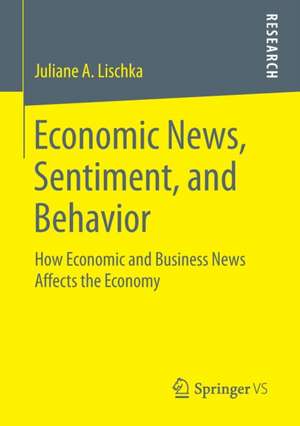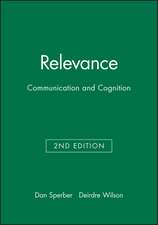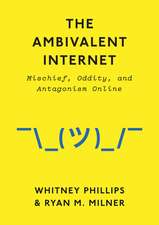Economic News, Sentiment, and Behavior: How Economic and Business News Affects the Economy
Autor Juliane A. Lischkaen Limba Engleză Paperback – 12 noi 2015
Preț: 378.92 lei
Nou
Puncte Express: 568
Preț estimativ în valută:
72.51€ • 79.01$ • 61.10£
72.51€ • 79.01$ • 61.10£
Carte tipărită la comandă
Livrare economică 23 aprilie-07 mai
Preluare comenzi: 021 569.72.76
Specificații
ISBN-13: 9783658115401
ISBN-10: 3658115408
Pagini: 129
Ilustrații: XVI, 129 p. 31 illus. in color.
Dimensiuni: 148 x 210 x 9 mm
Greutate: 0.2 kg
Ediția:1st ed. 2016
Editura: Springer Fachmedien Wiesbaden
Colecția Springer VS
Locul publicării:Wiesbaden, Germany
ISBN-10: 3658115408
Pagini: 129
Ilustrații: XVI, 129 p. 31 illus. in color.
Dimensiuni: 148 x 210 x 9 mm
Greutate: 0.2 kg
Ediția:1st ed. 2016
Editura: Springer Fachmedien Wiesbaden
Colecția Springer VS
Locul publicării:Wiesbaden, Germany
Public țintă
ResearchCuprins
Economic News and the Real Economy.- Economic News and Economic Sentiment.- Economic News, Economic Sentiment and Economic Behavior
Notă biografică
Juliane A. Lischka holds a PhD from the Institute of Mass Communication and Media Research (IPMZ), University of Zurich, and has been working at IPMZ as a postdoctoral researcher since completing her PhD in 2014. She was a Visiting Postdoctoral Fellow at the Reuters Institute for the Study of Journalism, University of Oxford, and at the Cardiff School of Journalism, Media & Cultural Studies, Cardiff University.
Textul de pe ultima copertă
This book explores the relations between objective, media-related, and social attitudinal as well as behavioral realities of private, expert, and corporate agents in the traditions of mass communication, journalism studies and behavioral economics. Results based on time series analyses for German data show that the news reports in a volatile manner on the economy and may influence its development through third-person effects. Bad economic news does not cause a decrease in private purchase intentions. Bad news may lead to a change in corporate decisions, such as advertising expenditures, because corporate decision makers may presume changes in consumer behavior through news.
Content
Juliane A. Lischka holds a PhD from the Institute of Mass Communication and Media Research (IPMZ), University of Zurich, and has been working at IPMZ as a postdoctoral researcher since completing her PhD in 2014. She was a Visiting Postdoctoral Fellow at the Reuters Institute for the Study of Journalism, University of Oxford, and at the Cardiff School of Journalism, Media & Cultural Studies, Cardiff University.
Content
- Economic News and the Real Economy
- Economic News and Economic Sentiment
- Economic News, Economic Sentiment and Economic Behavior
- Lecturers and students of communication science, economics, business administration, and psychology
- Business journalists, media managers, and advertising managers
Juliane A. Lischka holds a PhD from the Institute of Mass Communication and Media Research (IPMZ), University of Zurich, and has been working at IPMZ as a postdoctoral researcher since completing her PhD in 2014. She was a Visiting Postdoctoral Fellow at the Reuters Institute for the Study of Journalism, University of Oxford, and at the Cardiff School of Journalism, Media & Cultural Studies, Cardiff University.
Caracteristici
Social Science Study Includes supplementary material: sn.pub/extras










